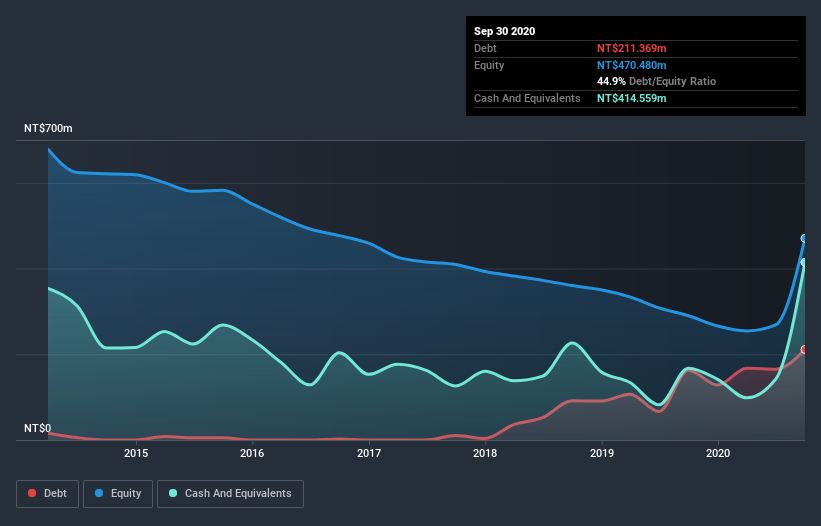
Warren Buffett famously said, 'Volatility is far from synonymous with risk.' It's only natural to consider a company's balance sheet when you examine how risky it is, since debt is often involved when a business collapses. We can see that Health & Life Co., Ltd. (GTSM:1781) does use debt in its business. But is this debt a concern to shareholders?
When Is Debt Dangerous?
Debt is a tool to help businesses grow, but if a business is incapable of paying off its lenders, then it exists at their mercy. Ultimately, if the company can't fulfill its legal obligations to repay debt, shareholders could walk away with nothing. However, a more frequent (but still costly) occurrence is where a company must issue shares at bargain-basement prices, permanently diluting shareholders, just to shore up its balance sheet. Of course, plenty of companies use debt to fund growth, without any negative consequences. The first step when considering a company's debt levels is to consider its cash and debt together.
View our latest analysis for Health & Life
What Is Health & Life's Debt?
The image below, which you can click on for greater detail, shows that at September 2020 Health & Life had debt of NT$211.4m, up from NT$162.8m in one year. But it also has NT$414.6m in cash to offset that, meaning it has NT$203.2m net cash.

How Healthy Is Health & Life's Balance Sheet?
We can see from the most recent balance sheet that Health & Life had liabilities of NT$340.7m falling due within a year, and liabilities of NT$105.6m due beyond that. Offsetting this, it had NT$414.6m in cash and NT$185.4m in receivables that were due within 12 months. So it can boast NT$153.6m more liquid assets than total liabilities.
This surplus suggests that Health & Life has a conservative balance sheet, and could probably eliminate its debt without much difficulty. Succinctly put, Health & Life boasts net cash, so it's fair to say it does not have a heavy debt load! The balance sheet is clearly the area to focus on when you are analysing debt. But it is Health & Life's earnings that will influence how the balance sheet holds up in the future. So when considering debt, it's definitely worth looking at the earnings trend. Click here for an interactive snapshot.
Over 12 months, Health & Life reported revenue of NT$643m, which is a gain of 47%, although it did not report any earnings before interest and tax. With any luck the company will be able to grow its way to profitability.
So How Risky Is Health & Life?
Although Health & Life had an earnings before interest and tax (EBIT) loss over the last twelve months, it made a statutory profit of NT$202m. So when you consider it has net cash, along with the statutory profit, the stock probably isn't as risky as it might seem, at least in the short term. We think its revenue growth of 47% is a good sign. There's no doubt fast top line growth can cure all manner of ills, for a stock. The balance sheet is clearly the area to focus on when you are analysing debt. But ultimately, every company can contain risks that exist outside of the balance sheet. For instance, we've identified 4 warning signs for Health & Life (2 don't sit too well with us) you should be aware of.
Of course, if you're the type of investor who prefers buying stocks without the burden of debt, then don't hesitate to discover our exclusive list of net cash growth stocks, today.
When trading Health & Life or any other investment, use the platform considered by many to be the Professional's Gateway to the Worlds Market, Interactive Brokers. You get the lowest-cost* trading on stocks, options, futures, forex, bonds and funds worldwide from a single integrated account. Promoted
If you're looking to trade Health & Life, open an account with the lowest-cost platform trusted by professionals, Interactive Brokers.
With clients in over 200 countries and territories, and access to 160 markets, IBKR lets you trade stocks, options, futures, forex, bonds and funds from a single integrated account.
Enjoy no hidden fees, no account minimums, and FX conversion rates as low as 0.03%, far better than what most brokers offer.
Sponsored ContentValuation is complex, but we're here to simplify it.
Discover if Health & Life might be undervalued or overvalued with our detailed analysis, featuring fair value estimates, potential risks, dividends, insider trades, and its financial condition.
Access Free AnalysisThis article by Simply Wall St is general in nature. It does not constitute a recommendation to buy or sell any stock, and does not take account of your objectives, or your financial situation. We aim to bring you long-term focused analysis driven by fundamental data. Note that our analysis may not factor in the latest price-sensitive company announcements or qualitative material. Simply Wall St has no position in any stocks mentioned.
*Interactive Brokers Rated Lowest Cost Broker by StockBrokers.com Annual Online Review 2020
Have feedback on this article? Concerned about the content? Get in touch with us directly. Alternatively, email editorial-team (at) simplywallst.com.
About TPEX:1781
Health & Life
Manufactures and sells products for cardiovascular disease, in-vitro diagnostics, and respiratory care worldwide.
Adequate balance sheet with acceptable track record.
Market Insights
Community Narratives




